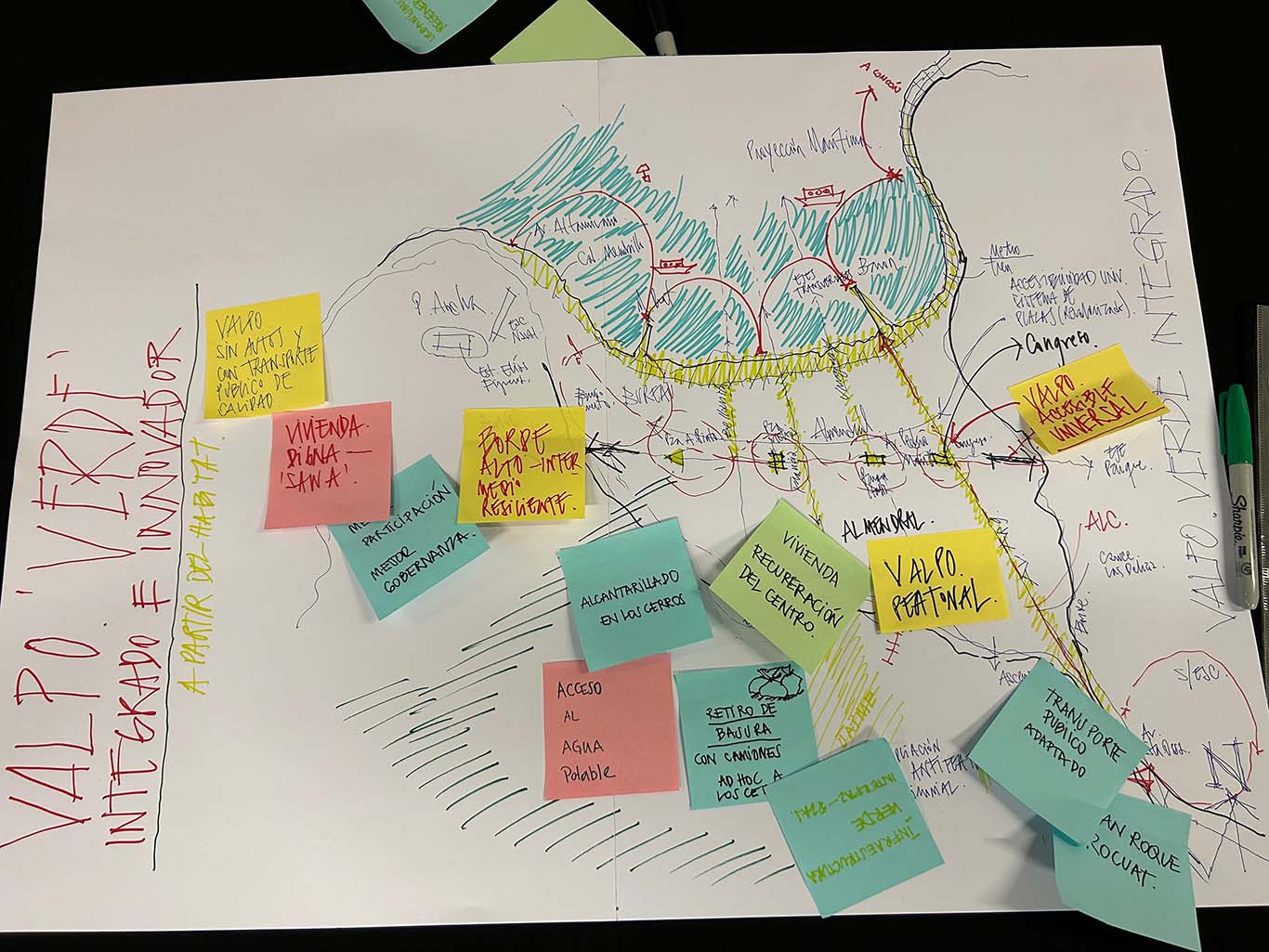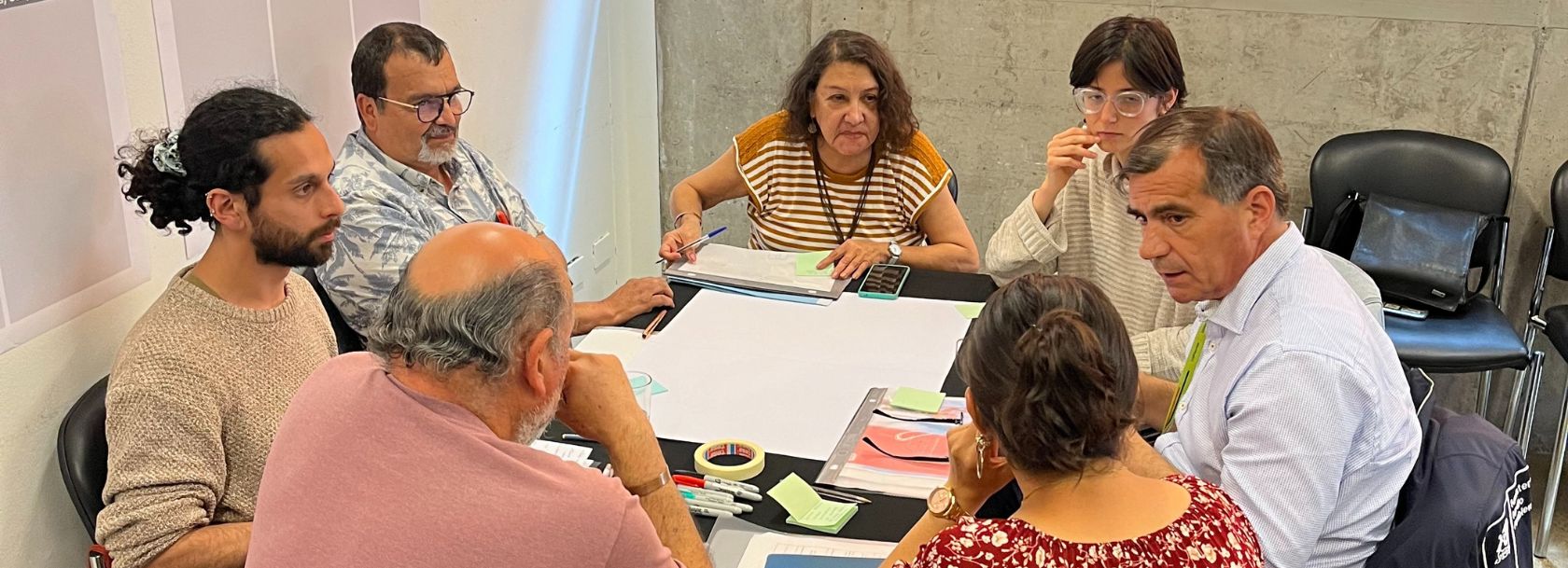On 12 December 2023, as a part of IHRB’s global project 'Building for Today and the Future: Advancing the Just Transition in the Built Environment', stakeholders across different sectors of the built environment gathered at Parque Cultural de Valparaiso. The workshop, organised by IHRB and local researchers, aimed to create a shared vision for socially inclusive climate action in Valparaiso's built environment.
Diversity was the hallmark of the workshop. The event was able to successfully gather government officials, civil society representatives, academics, architects, urban designers, engineers, and the private sector. This variety of actors brought a wealth of perspectives, fostering open dialogue and communication between them. Such diversity also allowed participants to have a holistic approach to thinking about inclusive climate actions in Valparaiso.
The project combines research methods and visioning in eight cities worldwide (Lagos, Prague, Lisbon, Melbourne, Copenhagen, Jakarta, Athens, and Valparaiso), to create evidence-based arguments for local and global advocacy for human rights in the built environment. The project focuses on four key areas: the right to housing; the rights of construction workers; meaningful participation; and non-discrimination and spatial justice.
Participants from the workshop included representatives from:
-
Academia (Universidad de Valparaíso and Centro de Desarrollo Urbano DUC)
-
Valparaiso Civil Society Council (COSOC)
-
Members of civil society and social movements (Movimiento de Defensa de Parques del Barrio O'Higgins, Arquitectos por Chile Digno and MENCH)
-
Workers Unions (Central Unitaria de Trabajadores)
-
The Regional Ministerial Secretariat of the Environment
-
The Professional Association of Architects of Valparaiso (Colegio de Arquitectos de Valparaíso)
-
Built environment industry organisations (Chile Green Building Council, Sur Andes)
Key Insights from the Visioning Session:
The workshop in Valparaiso unveiled crucial insights into the city's challenges and opportunities. One notable observation was the initial resistance of participants to dare to think about change, with a prevailing belief that urban transformation was either impossible or exceedingly difficult (given current limitations in the social, economic, and political spheres). However, a shift in tone occurred as representatives from Civil Society Organizations (CSOs), shared their perspectives. Their positive and hopeful contributions, not only inspired the envisioning process but also, encouraged others to embrace a more optimistic outlook for the future of Valparaiso’s built environment. The diversity of participants, in terms of sectors, but also in age, level of experience, backgrounds, and enthusiasm offered a balance between realism and idealism, a key combination for pragmatic and positive outlooks of the future.
Key Challenges and Opportunities:
Several challenges and opportunities emerged during the discussions. One notable challenge was the clash between different scales and dynamics in Valparaiso, particularly the tension between neighbourhood co-existence and broader intra-city interactions. Concerns were raised about the lack of effective citizen participation, exemplified by superficial consultations that did not genuinely consider public opinions. The need for cultural change, fostering civic appropriation and responsibility, and instilling pride in the city also surfaced as a significant challenge. On the positive side, participants envisioned a "Valpo Verde, Integrado e Innovador" (Green, Integrated, and Innovative Valparaiso) by 2030. Proposals included comprehensive resource distribution among the neighbourhoods in the city's hills, improved transportation infrastructure, and the development of sub centres and cultural hubs. The workshop highlighted the potential for Valparaiso to become a green and integrated city, emphasising support for local manufacturing, social and affordable housing, and the transformation of the port into a locally-inclusive productive hub –that does not bypass economic and social benefits for Valparaiso. The challenges related to workers’ organisation, leadership, and coordination were also identified, necessitating strategic planning and collaboration to overcome them.
The Valparaiso Visioning Workshop marked a pivotal step in creating a roadmap that prioritises human rights and sets the stage for a just transition in the city's built environment. The insights and discussions from this multi-stakeholder workshop combined with continued collaboration and action, and helped bring together a unified vision for a more equitable and sustainable built environment.
Participants workshopped what they would like to see “more of” and “less of” to facilitate the process towards a just transition in Valparaiso’s built environment.


This visioning workshop was organised, and this summary written by Rodrigo Caimanque, Belen Segura, and Sebastian Smart (independent research consultants for IHRB's Built Environment Programme in Valparaiso, Chile) and Alejandra Rivera, IHRB Global Programme Manager.



